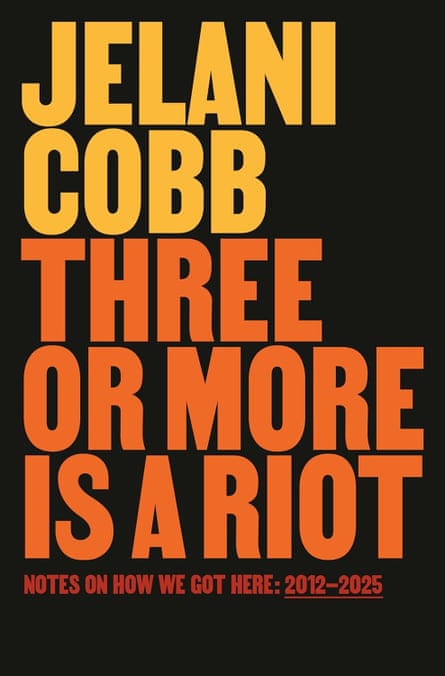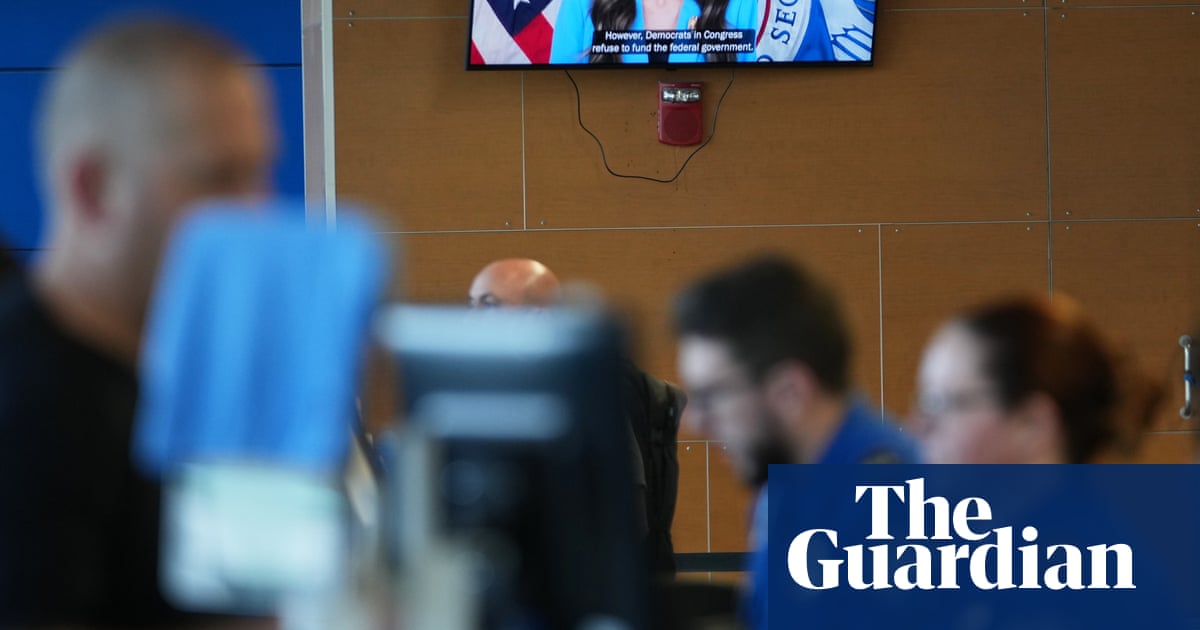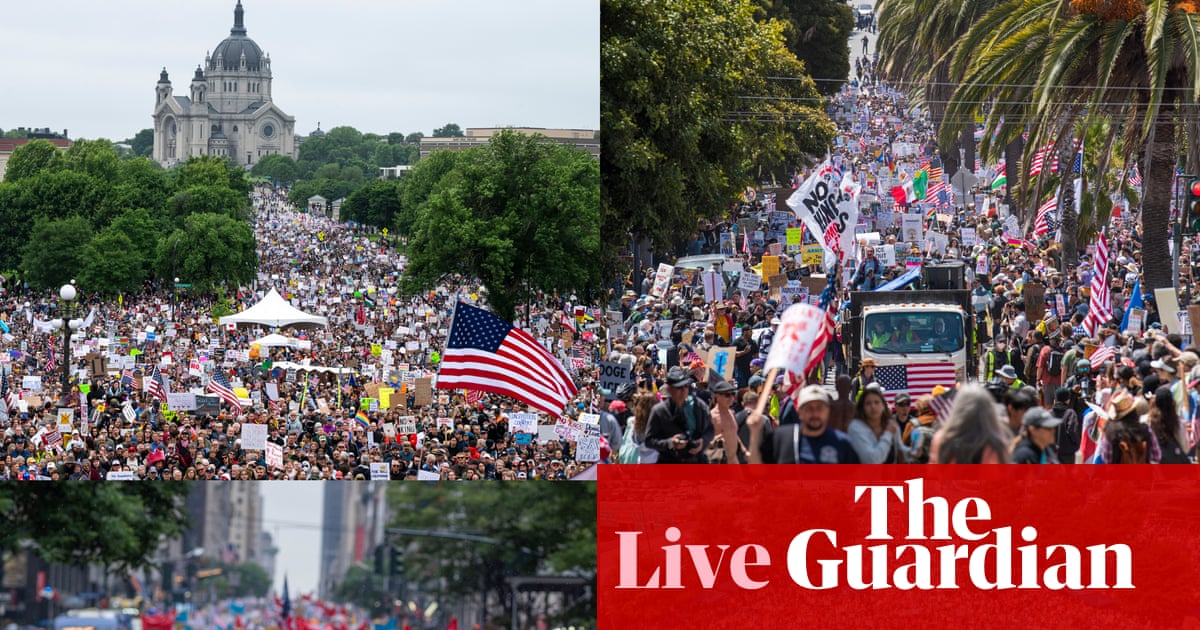“From the vantage point of the newsroom, the first story is almost never the full story,” writes Jelani Cobb. “You hear stray wisps of information, almost always the most inflammatory strands of a much bigger, more complicated set of circumstances.”
The dean of Columbia University’s Graduate School of Journalism in New York could be reflecting on the recent killing of the racist provocateur Charlie Kirk. In fact, he is thinking back to Trayvon Martin, a 17-year-old African American student from Florida who was shot dead by a white Latino neighbourhood watch volunteer in 2012.
“The Martin case – the nightmare specter of a lynching screaming across the void of history – ruined the mood of a nation that had, just a few years earlier, elected its first black president, and in a dizzying moment of self-congratulation, began to ponder on editorial pages whether the nation was now ‘post-racial’,” Cobb writes in the introduction to his book Three or More Is a Riot: Notes on How We Got Here: 2012-2025.
Many of the essays in the collection were written contemporaneously, affording them the irony – sometimes bitter irony – of distance. Together they form a portrait of an era bookended by the killing of Martin and the return to power of Donald Trump, with frontline reporting from Ferguson and Minneapolis along the way. They make a compelling argument that everything is connected and nothing is inevitable about racial justice or democracy.
As Cobb chronicles across 437 pages, the 2013 acquittal of Martin’s killer, George Zimmerman, became a catalyst for conversations about racial profiling, gun laws and systemic racism, helping to inspire the formation of the Black Lives Matter movement.
Three years later, Dylann Roof, a 21-year-old white supremacist, attended a Bible study session at Emanuel African Methodist Episcopal Church in Charleston, South Carolina, then opened fire and killed nine Black parishioners. Cobb notes that Roof told police he had been “radicalised” by the aftermath of Martin’s killing and wanted to start a “race war”.

Speaking by phone from his office at Columbia, Cobb, 56, says: “It was a very upside-down version of the facts because he looked on Martin’s death and somehow took the reaction to it as a threat to white people and that was what set him on his path. Roof was this kind of precursor of the cause of white nationalism and white supremacy that becomes so prominent now.”
Then, in the pandemic-racked summer of 2020, came George Floyd, a 46-year-old African American man murdered by a white police officer who kneeled on his neck for almost nine minutes as Floyd said, “I can’t breathe,” more than 20 times. Black Lives Matter protesters took to the streets with demands to end police brutality, invest in Black communities and address systemic racism across various institutions.
Cobb, an author, historian and staff writer at the New Yorker magazine, continues: “It was the high tide. A lot of the organising, a lot of the kinds of thinking, the perspective and the work and the cultural kinds of representations – these things had begun eight years earlier with Trayvon Martin’s death.
“This was an excruciating, nearly nine-minute-long video of a person’s life being extinguished and it happened at a time when people had nothing to do but watch it. They weren’t able to go to work because people were in lockdown. All of those things made his death resonate in a way that it might not have otherwise. There had been egregious instances of Black people being killed prior to that and they hadn’t generated that kind of societal response.”
Cities such as Minneapolis, Seattle and Los Angeles reallocated portions of police budgets to community programmes; companies committed millions of dollars to racial-equity initiatives; for a time, discussions of systemic racism entered mainstream discourse. But not for the first time in US history, progress – or at least the perception of it – sowed the seeds of backlash.
“It also was a signal for people who are on the opposite side of this to start pushing in the opposite direction and that happened incredibly swiftly and with incredible consequences to such an extent that we are now in a more reactionary place than we were when George Floyd died in the first place,” Cobb says.
No one better embodies that reactionary spirit than Donald Trump, who rose to political prominence pushing conspiracy theories about Barack Obama’s birthplace and demonising immigrants as criminals and rapists. His second term has included a cabinet dominated by white people and a purge of diversity, equity and inclusion (DEI) initiatives.
Trump lost the presidential election a few months after Floyd died but returned to power last year, defeating a Black and south Asian challenger in Kamala Harris. According to Pew Research, Trump made important gains with Latino voters (51% Harris, 48% Trump) and won 15% of Black voters – up from 8% in 2020.
What does Cobb make of the notion that class now outweighs race in electoral politics? “One of the things that they did brilliantly was that typically politics has worked on the basis of: ‘What will you do for me?’” Cobb says. “That’s retail politics. That’s what you expect.
“The Trump campaign in 24 was much more contingent upon the question of: ‘What will you do to people who I don’t like?’ There were some Black men who thought their marginal position in society was a product of the advances that women made and that was something the Republican party said overtly, which is why I think their appeal was so masculinist.”
Trump and his allies weaponised prejudice against transgender people to attract socially and religiously conservative voters, including demographics they would otherwise hold in “contempt”. “I also think that we tended to overlook the question of the extent to which Joe Biden simply handing the nomination to Kamala Harris turned off a part of the electorate,” Cobb says.
He expresses frustration with the well-rehearsed argument that Democrats became too fixated on “woke” identity politics at the expense of economic populism: “They make it seem as if these groups created identity politics. Almost every group that’s in the Democratic fold was made into an identity group by the actions of people who were outside.
“If you were talking about African Americans, Black politics was created by segregation. White people said that they were going to act in their interest in order to prevent African Americans from having access. Women, through the call of feminism, came to address the fact that they were excluded from politics because men wanted more power. You could go through every single group.”
Yet it remains commonplace to talk about appealing to evangelical Christian voters or working-class non-college-educated voters, he says: “The presumption implicit in this is that all those people see the world in a particular way that is understandable or legible by their identity, and so there’s a one-sidedness to it. For the entirety of his political career, Trump has simply been a shrewd promulgator of white-identity politics.”
That trend has become supercharged in Trump’s second term. He has amplified the great replacement theory, sought to purge diversity, equity and inclusion initiatives and complained that museums over-emphasise slavery. His actions have built a permission structure for white nationalists who boast they now have a seat at the top table.
Many observers have also expressed dismay at Trump’s concentration of executive power and the speed and scale of his assault on democratic institutions. Cobb, however, is not surprised.
“It’s about what I expected, honestly,” he says, “because throughout the course of the 2024 campaign, Trump mainly campaigned on the promises of what he was going to do to get back at people. They’re using the power of the state to pursue personal and ideological grievances, which is what autocracy does.”
after newsletter promotion
It is now fashionable on the left to bemoan the rise of US authoritarianism as a novel concept, a betrayal of constitutional ideals envied by the world. Cobb has a more complex take, suggesting that the US’s claim to moral primacy, rooted in the idea of exceptionalism, is based on a false premise.
He argues: “America has been autocratic previously. We just don’t think about it. It’s never been useful … to actually grapple with what America was, and America had no interest in grappling with these questions itself. Who has ever managed personal growth while constantly screaming to the world about how special and amazing they are?”
Cobb’s book maps an arc of the moral universe that is crooked and uneven, pointing out that, between the end of reconstruction and 1965, 11 states in the south effectively nullified the protections of the 13th, 14th and 15th amendments of the constitution, imposing Jim Crow laws, voter suppression and violence to disenfranchise Black citizens.
“The constitution gave Black people the right to vote but, if you voted, you’d be killed and this was a known fact,” he says. “This went on for decade after decade after decade. You can call that a lot of things. You can’t call that democracy. It was a kind of racial autocracy that extended in lots of different directions.”
He adds: “We should have been mindful that the country could always return to form in that way, that its commitment to democracy had been tenuous. That was why race has played such a central role in the dawning of this current autocratic moment. But it’s not the only dynamic.
“Immigration, which is tied to race in some ways, is another dynamic. The advances that women have made, the increasing acceptance and tolerance of people in the LGBTQ communities – all those things, combined with an economic tenuousness, have made it possible to just catalyse this resurgence of autocracy in the country.”
It is therefore hardly unexpected that business leaders and institutions would capitulate, as they have in the past, he says: “We might hope that they would react differently but it’s not a shock when they don’t. Go back to the McCarthy era. We see that in more instances than not, McCarthy and other similar kinds of red-baiting forces were able to exert their will on American institutions.”
Cobb’s own employer has been caught in the maelstrom. In February, the Trump administration froze $400m in federal research grants and funding to Columbia, citing the university’s “failure to protect Jewish students from antisemitic harassment” during Gaza protests last year. Columbia has since announced it would comply with nearly all the administration’s demands and agreed to a $221m settlement, restoring most frozen funds but with ongoing oversight.
Cobb does not have much to add, partly for confidentiality reasons, though he does comment: “In life, I have tended to not grade harshly for exams that people should never have been required to take in the first place.”
He is unwavering, however, in his critique of Trump’s attack on the university sector: “What’s happening is people emulating Viktor Orbán [the leader of Hungary] to try to crush any independent centres of dissent and to utilise the full weight of the government to do it, and also to do it in hypocritical fashion.
“The cover story was that Columbia and other universities were being punished for their failure to uproot antisemitism on their campuses. But it’s difficult to understand how you punish an institution for being too lenient about antisemitism and the punishment is that you take away its ability to do cancer research, or you defund its ability to do research on the best medical protocols for sick children or to work on heart disease and all the things that were being done with the money that was taken from the university.
“In fact, what is being done is that we are criminalising the liberal or progressive ideas and centres that are tolerant of people having a diverse array of ideas or progressive ideas. The irony, of course, is that one of the things that happens in autocracy is the supreme amount of hypocrisy. They have an incredible tolerance for hypocrisy and so all these things are being done under the banner of protecting free speech.”
That hypocrisy has been on extravagant display again in the aftermath of Kirk’s killing by a lone gunman on a university campus in Utah. Trump and his allies have been quick to blame the “radical left” and “domestic terrorists” and threaten draconian action against those who criticise Kirk or celebrate his demise. The response is only likely to deepen the US’s political polarisation and threat of further violence.
Spencer Cox, the governor of Utah and a rare voice urging civil discourse, wondered whether this was the end of a dark chapter of US history – or the beginning. What does Cobb think? “There’s a strong possibility that it will get worse before it gets better,” he says frankly.
“We’re at a point where we navigated the volatile moment of the 1950s, the 1960s, because we were able to build a social consensus around what we thought was decent and what we thought was right, and we’re now seeing that undone. Indecency has become a new hallmark.
“But we should take some solace in the fact that people have done the thing that we need to do now previously. The situation we’re in I don’t think is impossible.”

 German (DE)
German (DE)  English (US)
English (US)  Spanish (ES)
Spanish (ES)  French (FR)
French (FR)  Hindi (IN)
Hindi (IN)  Italian (IT)
Italian (IT)  Russian (RU)
Russian (RU)  3 hours ago
3 hours ago
























Comments